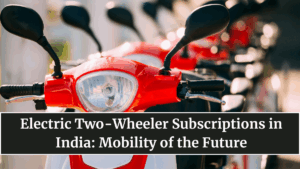In a country where two-wheelers dominate the roads, a new form of mobility is taking shape — electric two-wheeler subscription services. Instead of owning scooters or bikes outright, riders can now pay monthly or weekly fees to access e-scooters with zero maintenance, insurance, or EMI hassles.
This alternative mobility model is redefining urban commuting in India by combining flexibility, affordability, and sustainability. With cities like Bengaluru, Pune, and Delhi leading adoption, India is witnessing the birth of a new shared-economy revolution in the EV space.

Why Subscription Models Are Taking Off
Traditional ownership is losing appeal among young, urban Indians who prioritize convenience and freedom from long-term commitments. The electric two-wheeler subscription model addresses exactly that — offering cost-effective mobility with none of the burdens of maintenance or depreciation.
Key drivers fueling this trend include:
-
High fuel prices: Push consumers toward affordable electric mobility.
-
Convenience: No down payment, paperwork, or loan requirements.
-
Flexibility: Cancel, upgrade, or swap vehicles anytime.
-
Eco-conscious consumers: Growing awareness of clean transportation.
-
Urban delivery boom: E-commerce and food delivery fleets rely on e-scooter subscriptions.
In a post-pandemic world where last-mile connectivity has become essential, subscription-based mobility provides both economic and environmental value.
Major Players in India’s Two-Wheeler Subscription Ecosystem
A mix of startups and established companies are competing to dominate the subscription market with advanced EV fleets, telematics, and customer-friendly plans.
| Company | Type | Key Cities | Business Focus |
|---|---|---|---|
| Bounce Infinity | EV startup | Bengaluru, Hyderabad | Battery-swapping scooters on flexible monthly plans |
| Yulu | Micro-mobility | Pune, Delhi, Bengaluru | Shared e-bikes for short trips and gig workers |
| Revolt Motors | EV manufacturer | Multiple cities | Subscription-only ownership plans for e-motorcycles |
| Ola Electric | OEM-led | Pan-India | Planned leasing and subscription programs for delivery riders |
| eBikeGo & Zypp Electric | Fleet operators | NCR, Pune | B2B subscription for logistics and delivery fleets |
These companies are merging mobility-as-a-service (MaaS) with clean energy to serve both individuals and businesses — especially gig economy riders and corporate delivery fleets.
How the Subscription Model Works
The subscription model replaces traditional ownership with access-based plans. Instead of paying a lump sum or EMIs, users subscribe to vehicles on flexible terms — typically weekly, monthly, or yearly.
A standard package includes:
-
Vehicle rental (with or without battery)
-
Maintenance and insurance coverage
-
App-based monitoring and service tracking
-
Optional battery-swap or home-charging options
This makes it especially attractive for urban delivery partners who need predictable costs and 24/7 mobility.
Economic and Environmental Benefits
The rise of two-wheeler subscriptions is not just transforming mobility — it’s also improving India’s economy and environment.
-
Reduced congestion: Encourages shared use and lower vehicle ownership.
-
Cleaner air: Accelerates adoption of zero-emission two-wheelers.
-
Affordable mobility: Reduces total cost of ownership for students and workers.
-
Fleet optimization: Data-driven operations help companies manage vehicles efficiently.
-
Energy savings: Promotes efficient battery usage and recycling.
The model aligns perfectly with India’s Net Zero by 2070 goals and growing demand for green logistics.
Challenges Facing Subscription-Based Mobility
Despite its promise, the sector faces some roadblocks before mass adoption:
-
Battery degradation costs: High battery maintenance increases fleet expenses.
-
Limited charging and swapping stations: Infrastructure still expanding beyond metros.
-
Regulatory hurdles: Differing state EV policies complicate licensing.
-
User awareness: Many riders still equate subscription with rental, not long-term access.
-
Fleet sustainability: Operators need steady investment to scale operations profitably.
To overcome these, players are partnering with battery-as-a-service (BaaS) companies and state EV missions to expand access and awareness.
The Future of Two-Wheeler Subscriptions in India
By 2030, analysts predict that up to 35% of India’s two-wheeler market could operate on subscription or lease models — especially in dense urban regions. With advances in AI-powered fleet management, dynamic pricing, and swappable battery systems, India’s mobility sector is poised for a massive transformation.
Future growth will likely come from:
-
Expansion into Tier-2 and Tier-3 cities.
-
Integration of battery swapping and solar-powered charging hubs.
-
Hybrid subscription models combining EVs with insurance and finance.
-
Government support under FAME-III and Gati Shakti initiatives.
The future of mobility isn’t about owning your ride — it’s about accessing it whenever, wherever, and sustainably.
FAQs
What is an electric two-wheeler subscription?
It’s a service where users pay a recurring fee to use an electric scooter or bike, covering maintenance, insurance, and other costs.
Who are the main players in this space?
Bounce Infinity, Yulu, Zypp Electric, Revolt Motors, and Ola Electric are among the leading companies in India’s subscription market.
How does this model benefit consumers?
Users avoid ownership hassles, high fuel costs, and depreciation — paying only for access and usage.
Are subscription-based EVs reliable for daily use?
Yes, fleets are maintained regularly, and most providers offer replacement vehicles in case of breakdowns.
What’s the future of two-wheeler subscriptions in India?
As EV adoption grows, subscription models will dominate affordable, flexible, and eco-friendly urban mobility by 2030.
Click here to know more.
